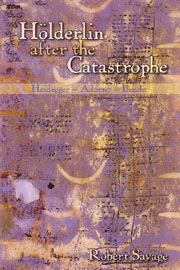Book contents
1 - Conversation: Heidegger, “Das abendländische Gespräch”
Published online by Cambridge University Press: 05 February 2013
Summary
Irr gieng er nun; denn allzu gut sind Genien; himmlisch Gespräch ist sein nun.
[He has gone astray; for all too good are Genii; heavenly talk is his now.]
— Hölderlin, “Ganymed”MARTIN HEIDEGGER'S RECEPTION of Hölderlin's poetry is characterized as much by its remarkable constancy and longevity as by its metamorphoses, discontinuities, and occasional U-turns. The leitmotif in the conversation is easy enough to identify: the conviction he announced in 1934, at the beginning of his first lecture course on Hölderlin, that the poet's “still space-time-less work has already overcome our petty historical affairs and founded the inception of another history, that history that commences with the struggle for the decision about the arrival or flight of the god,” will never waver.1 It animates the two other lecture courses devoted to Hölderlin that he gave during the Third Reich; it stands behind the speeches and essays collected in Erläuterungen zu Hölderlins Dichtung (Elucidations to Hölderlin's Poetry, 1944); it resurfaces, its eschatological tone intact, if somewhat less grandiloquently inflected, in the postwar pieces on technology, poetry, and dwelling; and it is reaffirmed in the Spiegel interview of 1966. In that conversation, posthumously published under the title “Nur noch ein Gott kann uns retten” (Only a God Can Save Us), Heidegger insists that his thinking “stands in an absolutely necessary relation to the poetry of Hölderlin.” The two statements find their common ground in the solemn words Heidegger had uttered over thirty years before.
- Type
- Chapter
- Information
- Hölderlin after the CatastropheHeidegger - Adorno - Brecht, pp. 32 - 95Publisher: Boydell & BrewerPrint publication year: 2008



